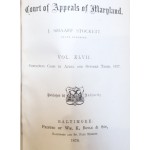Maryland reports, containing cases adjudged in the Court of Appeals of that state (1851-1948) (188 volumes)
Maryland reports, containing cases adjudged in the Court of Appeals of that state (1851-1948) (188 volumes)
Oliver Miller; Maryland. Court of Appeals.; State of Maryland
Annapolis : Robert F. Bonsall; Baltimore: M. Curlander; State of Maryland; Michie Company, 1857 - 1968.
A massive 188 volume set that shows the evolution of Maryland's judiciary. Contains Reports of the Maryland Appeals Court for: 1851 - 1948 (with gaps). Additional volumes from 1961, 1967, 1968. Missing volumes: 76, 85, 90, 91, 93, 172, 175, 177, 190.
This collection contains the Maryland Court of Appeals decisions during the mid-19th century to mid-20th century. Vols. 1-8 (1851-1855), and vols. 32, (1869-1870), 41 (1874), 56 (1880-1881) are the Peterson reprint, printed circa 1896. Volumes are bound in tan legal cloth with red and black spine labels. Good binding and covers. Internally, clean, unmarked pages. Some of the early volumes have restoration work where the paper has torn at the margins. Scattered State of Maryland stamps. The set appears to have been from the Court's library. An important legal reference of the supreme court of Maryland. Opinions are arranged chronologically. Each volume has a table of cases, a list of the judges of the court, an index of petitions for certiorari, a table of statutes cited, and an index digest.
According to Judge Bond, the Court was reformed in the 1851 Maryland Constitution which required a written opinion to be printed. For this reason, the Reports begin in 1851. Many of the early Reports deal with slavery and "negroes".
A few of the more interesting cases include: Northern Central Company vs. Mary Ann Scholl (1860), where the Court ruled that a railway company was liable for the loss of a slave owner of a slave who escaped into free soil Pennsylvania via a train ticket.
Adeline Brown vs. Maryland (1865). Brown was accused of encouraging a negro apprentice to flee their servitude. Slavery was abolished in the 1864 Maryland Constitution. To sidestep this inconvenient liberation, an apprenticeship scheme was constructed by Maryland to keep black children in bondage, involuntary indenture, i.e. slavery by another name. The rationale behind this law was that blacks needed to be taught "the habits of industry" and that this was in the best interest of the child. In practice this meant that black children were forced to be servants without pay to their former masters, without the right of their parents to have a say. It gave the Court the ability to make this contractual "binding" of master to apprentice until the age of 21. The legislature, in keeping with past practices, made it illegal to encourage "apprentices" to abscond.
In Coston v. Coston, 25 Md. 500 (Md. 1866), Leah Coston, a recently freed slave, attempted to gain her children, who were being held in this apprenticeship program by her former master. (Maryland's apprenticeship program was appealed to the US Supreme Court in Re Turner, where Justice Samuel P. Chase ruled decidedly against it.) [See, Zachary S. Schultz's, Coston v. Coston, 25 Md. 500 (Md. 1866): The Plight of One Family Out of Many Fighting Apprenticeship in Reconstruction Maryland.]
Other landmark cases include, In re Taylor, 1877, where the court ruled African Americans didn't have the right to practice law (not changed until 1888).
In re Etta H. Maddox, 1901, the Maryland Court of Appeals ruled Women could not practice law in Maryland. (This decision was overturned in 1902, when Maddox became the first female attorney in Maryland.)
In Murray v. University of Maryland, Donald Murray, a black Marylander, successfully sued for admission to the University of Maryland School of Law based on the Equal Protection Clause of the Fourteenth Amendment. Baltimore NAACP attorneys Charles Hamilton Houston and Thurgood Marshall (the future Supreme Court Justice) argued for Murray.
In Weyler v. Gibson, 110 Md. 636 (1909), the Court ruled in favor of the state taking private property for the expansion of the Maryland State Penitentiary. The case featured the right of the state to use eminent domain and condemnation against a private property owner.
In totality, the Reports of the Maryland Court of Appeals show the gradual and hard-fought advancement of the rights of all people in Maryland. The Reports illustrate the evolution of Maryland from a conservative, Southern, agricultural state, where the black population was denied basic freedoms, to one that guaranteed equal protection under the law. Maryland served as the beachhead for the Nathan Ross Margold and the NAACP's legal strategy of attacking "separate but equal," in Murray and in Williams v. Zimmerman. This collection represents an important history of Maryland law, unlikely to be offered for sale again. This is an extremely large and heavy set, that requires additional postage for delivery.
-600x600.JPG)
-150x150.JPG)
-150x150.JPG)
-150x150.JPG)
-150x150.JPG)
